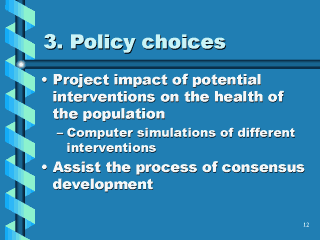 |
Epidemiology can inform
decision-making by providing projections of the impact of potential interventions on the
health of the population. Computer simulations of health and disease are very useful here,
given their ability to superimpose the epidemiologic processes upon the underlying
population dynamics, dealing with far more variables that the human mind can manage, and
considering both beneficial and adverse effects and subtle phenomena like the compression
of morbidity. Thereby, they can provide answers to “What if” questions like “What
would be the effect on the overall health of the population if we reduced smoking by
20%?”, Better yet, they can often compare the probable health impact of different
interventions, and provide the basis for the economic analyses that will help
policy-makers choose among them. Epidemiology can also assist the process of consensus
development for selection of a particular policy, using priority-setting techniques
borrowed from the social sciences. |
